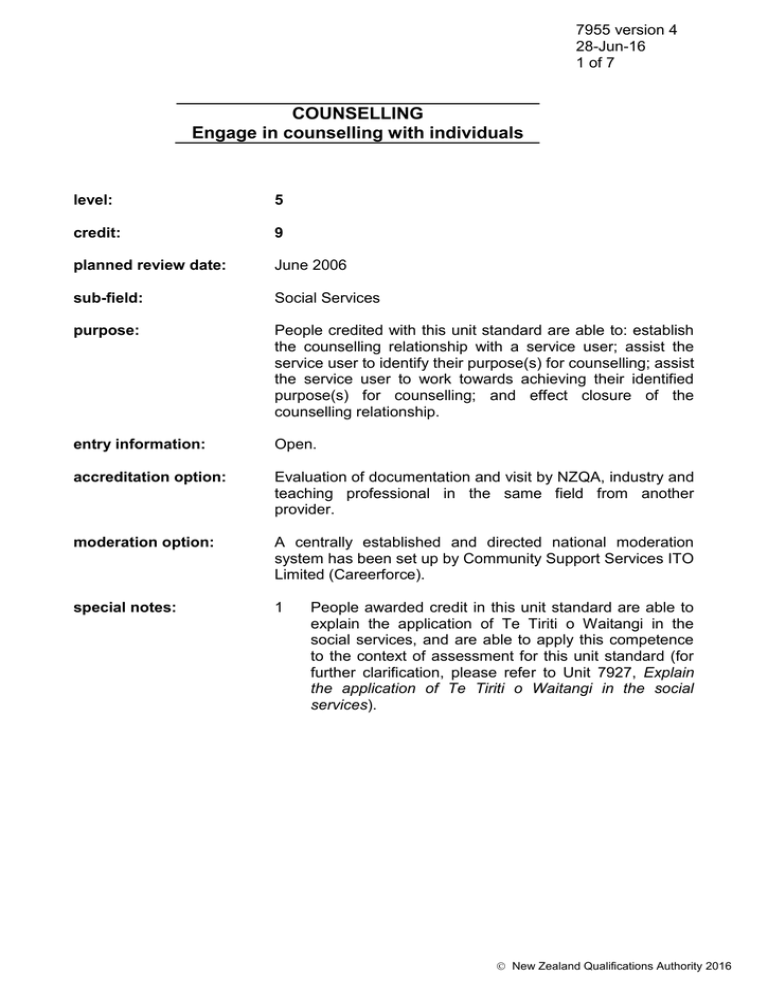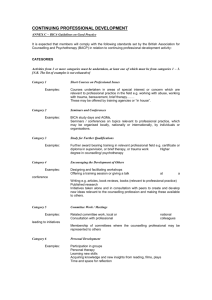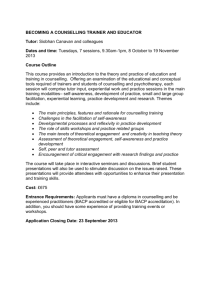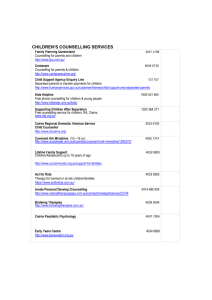COUNSELLING Engage in counselling with individuals
advertisement

7955 version 4 28-Jun-16 1 of 7 COUNSELLING Engage in counselling with individuals level: 5 credit: 9 planned review date: June 2006 sub-field: Social Services purpose: People credited with this unit standard are able to: establish the counselling relationship with a service user; assist the service user to identify their purpose(s) for counselling; assist the service user to work towards achieving their identified purpose(s) for counselling; and effect closure of the counselling relationship. entry information: Open. accreditation option: Evaluation of documentation and visit by NZQA, industry and teaching professional in the same field from another provider. moderation option: A centrally established and directed national moderation system has been set up by Community Support Services ITO Limited (Careerforce). special notes: 1 People awarded credit in this unit standard are able to explain the application of Te Tiriti o Waitangi in the social services, and are able to apply this competence to the context of assessment for this unit standard (for further clarification, please refer to Unit 7927, Explain the application of Te Tiriti o Waitangi in the social services). New Zealand Qualifications Authority 2016 7955 version 4 28-Jun-16 2 of 7 COUNSELLING Engage in counselling with individuals 2 Glossary Characteristics and needs of service users may be physical, spiritual, or mental. Characteristics and needs may include but are not limited to: age and stage of development, coping strategies, culture, disability, experience, knowledge, family or whānau history, gender, health status, language, sexual orientation, socio-economic situation; and needs for physical comfort, safety, and privacy of the service user. Service user is used as a generic term to denote an individual from user groups of the social services who is involved in the counselling relationship. Other terms such as "client" may be used across the range of social service settings. 3 People awarded credit in this unit standard are able to demonstrate and self monitor their ability to relate to difference, as evidenced by acknowledgement and respect for difference, acceptance, genuineness, honesty, humility, patience, and warmth. They use inclusive language, and counselling methods that are appropriate to the characteristics and needs of the service user. They seek to establish and maintain rapport with the service user, positive feedback is responded to, criticism, or negative feedback is responded to without defensiveness, and changes required to re-establish rapport are acted upon. They demonstrate and communicate clarity about their role in the social services within all relationships with service users. They know the limits of their role, function and competence, and when to refer on to others. New Zealand Qualifications Authority 2016 7955 version 4 28-Jun-16 3 of 7 COUNSELLING Engage in counselling with individuals 4 In any given situation, candidates may not complete all elements of this unit standard. For example, the service user may not need the candidate to assist them to implement a plan, so the candidate may then move on to establish closure of the relationship. However, it is necessary to demonstrate competence in all elements of this unit standard in order to be awarded credit. 5 All communications are treated confidentially. The scope and limits of confidentiality are defined through negotiation and informed consent, and criteria established by legislation, ethical practice, and service provider guidelines. In the context of this unit standard, sources of criteria established by legislation, ethical practice, and service provider guidelines include but are not limited to: Official Information Act 1982, Privacy Act 1993, service provider codes of conduct, codes of practice issued by the Privacy Commissioner, social service codes of ethics, and service provider guidelines, protocols, staff manuals, strategic plans, kawa, or tikanga. 6 People awarded credit in this unit standard show that their actions are guided and supported by valid theory for social service practice. Evidence is required of social service theory that is derived from authoritative sources, which may include but are not limited to: body of knowledge related to social service work; cultural theory; practice research. New Zealand Qualifications Authority 2016 7955 version 4 28-Jun-16 4 of 7 COUNSELLING Engage in counselling with individuals Elements and Performance Criteria element 1 Establish the counselling relationship with a service user. performance criteria 1.1 Establishment of the environment attends to the service user’s characteristics and needs. 1.2 The role, function, and any legal responsibilities of the social service worker and service provider are clarified with the service user. 1.3 The kawa or protocols for the counselling relationship are agreed with the individual. 1.4 The service user is engaged in counselling according to their characteristics and needs, and in accordance with the social service worker's role, function, and any legal responsibilities. element 2 Assist the service user to identify their purpose(s) for counselling. Range: assistance may include but is not limited to - co-creating and exploring alternatives, challenging, coaching, confrontation, exploring past and current behaviours, patterns and beliefs, feedback, focusing, making connections, providing information, referral to other services, reframing. Evidence is required of five. performance criteria 2.1 The process to be used to identify the service user's concerns, issues, or needs is established according to negotiation with the service user. New Zealand Qualifications Authority 2016 7955 version 4 28-Jun-16 5 of 7 COUNSELLING Engage in counselling with individuals 2.2 Assistance enables the service user to identify and describe their presenting concerns, issues, or needs. 2.3 Assistance is provided using interpersonal skills that respond to verbal and nonverbal communications including body language. Range: interpersonal skills include but are not limited to - attending, clarifying, encouraging, following, listening, questioning, paraphrasing, reflecting. 2.4 The service user is assisted to identify connections between their identified concerns, issues, or needs, and their social and cultural context. 2.5 The service user is assisted to identify purpose(s) for counselling that are consistent with their concerns, issues, or needs, and consistent with their coping abilities, knowledge, resources, skills, and values. element 3 Assist the service user to work towards achieving their identified purpose(s) for counselling. Range: assistance may include but is not limited to - co-creating and exploring alternatives, challenging, coaching, confrontation, exploring past and current behaviours, patterns and beliefs, feedback, focusing, making connections, providing information, referral to other services, reframing. Evidence is required of five. performance criteria 3.1 Assistance enables the service user to identify and select achievable options consistent with their purpose(s) for counselling, and consistent with their coping abilities, knowledge, resources, skills, and values. New Zealand Qualifications Authority 2016 7955 version 4 28-Jun-16 6 of 7 COUNSELLING Engage in counselling with individuals 3.2 Assistance enables the service user to develop a plan to achieve their identified purpose(s) for counselling. 3.3 The plan identifies resources that are available to achieve the purpose(s), a time frame that is consistent with the use of those resources, the social service worker's role in the plan (if any), and methods of evaluating progress. 3.4 Assistance is provided in accordance with the social service worker's role in the plan. 3.5 Assistance is provided using methods that encourage self determination by the service user and discourage dependency on the social service worker or service provider. 3.6 Assistance enables the service user to evaluate progress in achieving their purpose(s) for counselling. 3.7 Where necessary, the service user is assisted to redefine their purpose(s) for counselling, establish new purposes, identify further options, and amend the plan in terms of the evaluation of progress. element 4 Effect closure of the counselling relationship. performance criteria 4.1 Closure of each counselling session is effected according to the established kawa or protocol. 4.2 Closure of the counselling relationship is effected according to completion of planned involvement of the social service worker or service provider. New Zealand Qualifications Authority 2016 7955 version 4 28-Jun-16 7 of 7 COUNSELLING Engage in counselling with individuals 4.3 The closure process identifies issues arising from counselling. Range: 4.4 The closure process identifies issues for future involvement in counselling. Range: 4.5 issues may include but are not limited to - identification of achievements and new learning towards independence; ways of dealing with future concerns, issues, or needs; ongoing self management plans. issues may include but are not limited to - factors that may lead to resumption of contact; future roles, functions, and services; means of re-establishing contact with the social service worker and service provider; other sources of referral. Closure of the counselling relationship is managed according to the established kawa or protocol. Comments to: Careerforce PO Box 2637 Wellington 6140 Please Note: Providers must be accredited by the Qualifications Authority before they can offer programmes of education and training assessed against unit standards. Accredited providers assessing against unit standards must engage with the moderation system that applies to those unit standards. [Please refer to relevant Plan ref: 0222] New Zealand Qualifications Authority 2016




